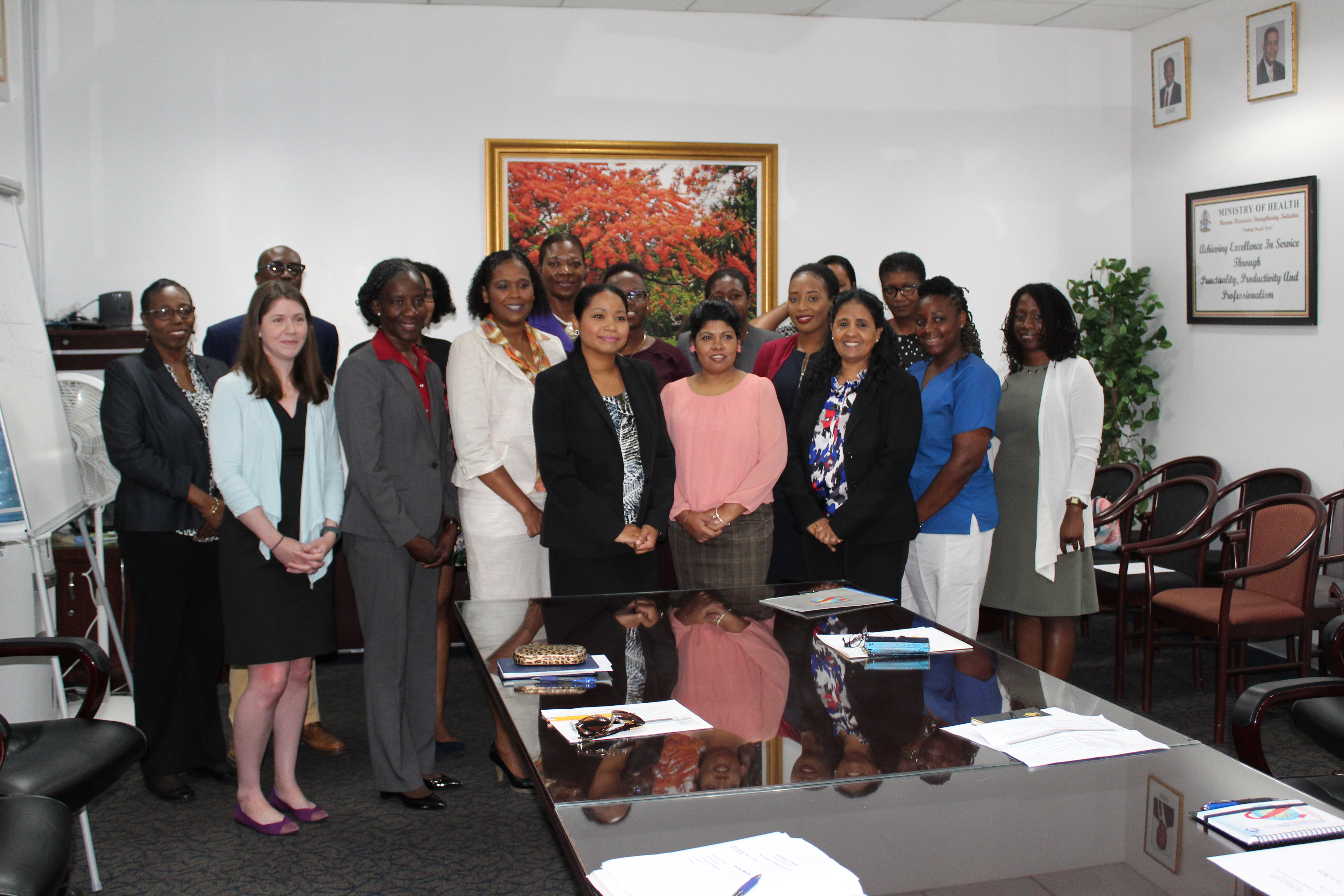
PANCAP Learning Exchange promotes value of PrEP for prevention of HIV transmission
Image: (Front row, second from left) Ms Prenell King-Rolle, Acting Permanent Secretary, Ministry of Health, The Bahamas , Dr Pearl McMillan, Chief Medical Officer, Ministry of Health, The Bahamas, Dr Nikkiah Forbes, Director of the National HIV/AIDS and Infectious Disease Programme, Ministry of Health, The Bahamas; (Front row, first from right) Dr Shanti Singh-Anthony, Knowledge Management Coordinator, PANCAP Knowledge for Health Project with participants of the PANCAP Learning Exchange and employees of the Ministry of Health, The Bahamas.
Friday, 17 May 2019 (PANCAP Coordinating Unit, CARICOM Secretariat): The Pan-Caribbean Partnership against HIV and AIDS (PANCAP), the mechanism that provides a structured and unified approach to the Caribbean’s response to the HIV epidemic, collaborated with The Bahamas Ministry of Health National AIDS Programme to coordinate a learning exchange that focused on The Bahamas’s experience in the implementation of Pre-exposure prophylaxis (PrEP). The capacity building initiative was held from 6 -10 May 2019 and also focused on “Treat All”, the transition to Dolutegravir, and laboratory support for viral suppression.
The initiative was led by Dr Shanti Singh-Anthony, PANCAP Knowledge Management Coordinator, who explained that the learning exchange was designed for participants to experience first-hand the process utilized by The Bahamas Ministry of Health National AIDS Programme to coordinate and collaborate with civil society organisations, the private sector, and other stakeholders to deliver comprehensive HIV services to communities, particularly key populations.
Dr Singh-Anthony also highlighted that participants were exposed to critical aspects of The Bahamas’ PrEP programme and benefitted from an explanation of how the country transitioned to the use of the highly effective antiretroviral therapy, Dolutegravir.
The countries participating in the learning exchange event included Guyana, Jamaica and the Republic of Trinidad and Tobago.
Multi-disciplinary country teams participated in the event. The teams comprised of National AIDS Programme Managers, Clinical Care Coordinators, HIV clinicians and civil society organisation (CSO) representatives who work closely with the national programme in the implementation of PrEP and other aspects of the HIV response. A total of seven persons from the three countries participated and interacted with representatives of the Ministry of Health The Bahamas, clinical and laboratory staff, and CSO representatives.
Dr Singh-Anthony explained that site visits were conducted to community clinics where participants interacted with key clinic staff in the areas of HIV testing, treatment, community outreach, documentation, and monitoring and reporting. This allowed participants to understand how services are organised and delivered, the number and skill set of the clinical team, and other resources available for supporting service delivery.
Participants also interacted with the beneficiaries of the clinics, particularly key populations and participated in community outreach activities led by the National AIDS Programme and CSO teams aimed at increasing access to services by key populations.
Dr Singh-Anthony believes that the Learning Exchange is critical to the implementation of PrEP in the Region. “The Caribbean is on the cusp of fully embracing and implementing PrEP. Hence, it was crucial for PANCAP to lead this multidisciplinary team on a learning journey to expand their understanding of how PrEP can improve clinical management and outcomes for individuals at risk for HIV. The overarching aim is for the Learning Exchange to act as an impetus for more expansion of knowledge on PrEP and its eventual implementation across the Region”.
The Learning Exchange forms part of the PANCAP Knowledge for Health Project with funding from the United States Agency for International Development (USAID).
Contact:
Timothy Austin
Communications Specialist
PANCAP Coordinating Unit
CARICOM Secretariat
Turkeyen, Greater Georgetown, Guyana
Email: taustin.consultant@caricom.org
Tel: (592) 222-0001-75, Ext. 3409
Website: www.pancap.org
Helpful links:
PANCAP Knowledge for Health Project
Video – HIV – Pre-exposure prophylaxis (PrEP) in the Bahamas
https://pancap.org/pancap-events/hiv-pre-exposure-prophylaxis-prep-in-the-bahamas/
What is PANCAP?
PANCAP is a Caribbean regional partnership of governments, regional civil society organisations, regional institutions and organisations, bilateral and multilateral agencies and contributing donor partners which was established on 14 February 2001. PANCAP provides a structured and unified approach to the Caribbean’s response to the HIV epidemic, coordinates the response through the Caribbean Regional Strategic Framework on HIV and AIDS to maximise efficient use of resources and increase impact, mobilises resources and build capacity of partners.
WHAT IS PANCAP?
PANCAP is a Caribbean regional partnership of governments, regional civil society organisations, regional institutions and organisations, bilateral and multilateral agencies and contributing donor partners established on 14 February 2001. PANCAP provides a structured and unified approach to the Caribbean’s response to the HIV epidemic, and coordinates the response through the Caribbean Regional Strategic Framework on HIV and AIDS to maximise efficient use of resources and increase impact, mobilise resources and build the capacity of partners.
What are the Global AIDS Strategy 2021–2026 targets and commitments?
If targets and commitments in the strategy are achieved:
- The number of people who newly acquire HIV will decrease from 1.7 million in 2019 to less than 370 000 by 2025
- The number of people dying from AIDS-related illnesses will decrease from 690 000 in 2019 to less than 250 000 in 2025.
- The goal of eliminating new HIV infections among children will see the number of new HIV infections drop from 150,000 in 2019 to less than 22,000 in 2025.
What are the 95-95-95 Targets for ending AIDS?
- 95% of People Living with HIV know their HIV status;
- 95% of people who know their status on treatment; and
- 95% of people on treatment with suppressed viral loads.
HELPFUL LINKS:
Global AIDS Strategy 2021–2026, End Inequalities, End AIDS
https://pancap.org/pancap-documents/global-aids-strategy-2021-2026-end-inequalities-end-aids/
Caribbean Regional Strategic Framework on HIV and AIDS (CRSF) 2019-2025
https://pancap.org/pancap-documents/caribbean-regional-strategic-framework-2019-2025/
